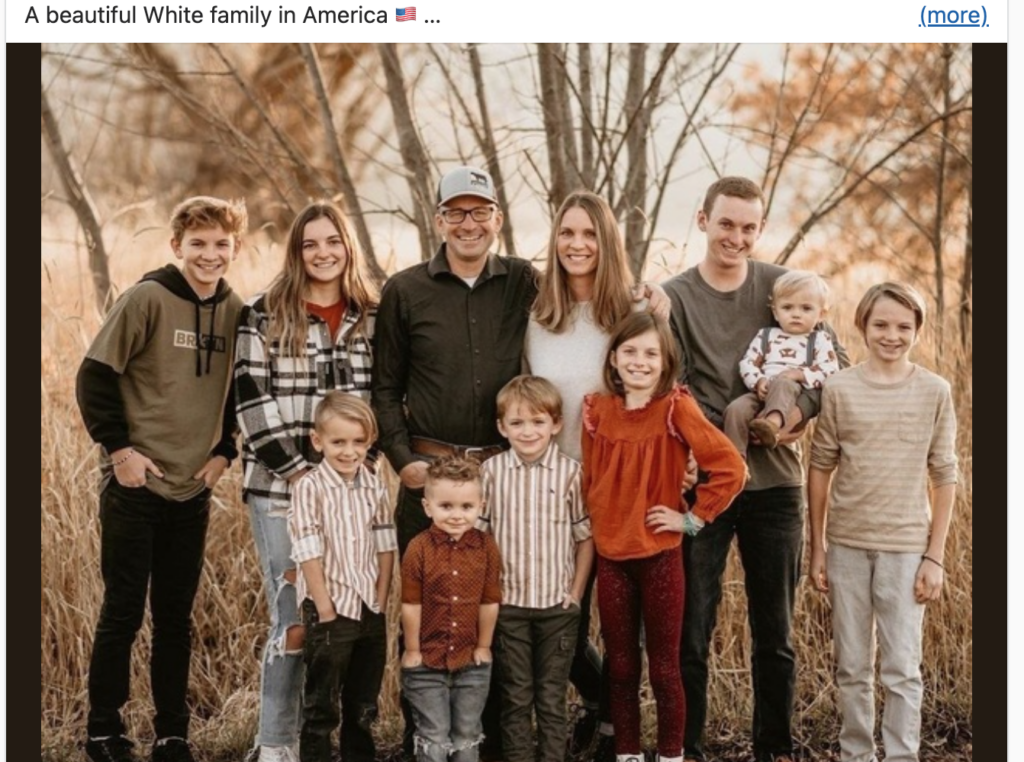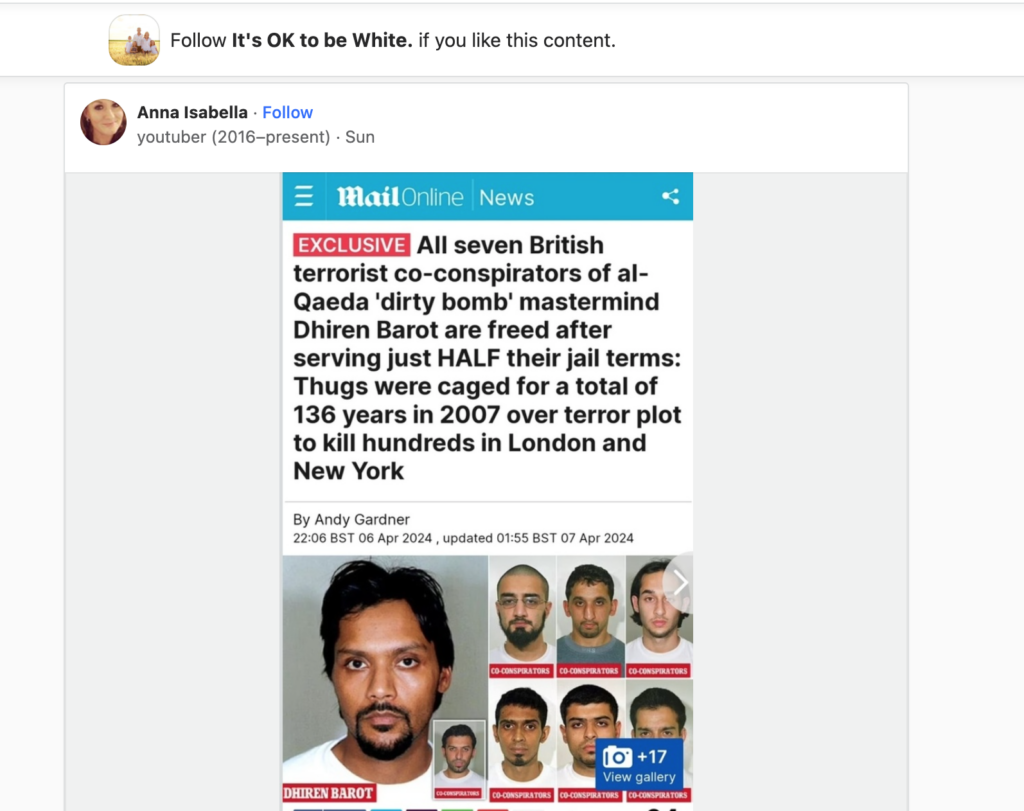It’s OK to Be White: Examining White Identity Expression
September 15, 2024

We all recognize how various ethnic groups express their identities. However, white racial identity and its expression often lead to debates, with many asserting that white Americans lack a distinct culture. White folks emphasize individuality over racial or ethnic identity, whether they hold racial resentment or advocate for anti-racism. Although this is not problematic, individuality is not extended to other groups. Additionally, not understanding one is part of an ethnic group and culture allows individuals to dismiss problematic behaviors normalized within the culture.
This unique racial experience differs from other groups. White folks express their racial identity in their own way, recognizable even if not explicitly named. But what does this expression look like? What implications does it have for anti-racism efforts and the future of American society?
In this post, I will present findings from an online forum centered around white identity and analyze the data to understand how participants express their white identity. I will then compare this with expressions of white identity in real life and how they relate to the expressions of identity by other groups. Lastly, I will discuss what these findings could imply for our future.
Gathering evidence
I collected data from an online forum created as a space for whites to discuss the things relevant to white culture and identity. Like any other platform dedicated to a particular group, whites have the same opportunity to celebrate and express their identity without devolving into white nationalism and White Supremacy. It’s possible but whether it can be done, or not is separate from what is.
I focused on the forum “It’s OK to Be White.” This forum is public and visible, so whatever is discussed or shared is done explicitly and implicitly. My goal was to categorize each post type and then tally each category.
I wanted to find out what a public forum centered on white identity would produce and if the findings align with what others see and think of regarding whiteness. Understanding how white identity is expressed and negotiated online can help us better understand how racial attitudes and beliefs are shaped in society.
It’s OK to Be White states that the forum is dedicated to uplifting and affirming white culture and opposing anti-White racism. They also include in their community guidelines that they do not tolerate racism, even racism directed at other groups.
How I organized my findings
Assigning every post to a single category was very difficult to do at times.
For example, a post about immigration could also include “white genocide” claims. Claims of white superiority might be included in a post that was meant to shame white women specifically for interracial mixing.
Ultimately, I chose to assign each post to one category. However, I increased my categories to more accurately label posts.
For example, I created a category for news about immigration, a category for anti-immigration, and a category for anti-Muslim rhetoric.
I also reached out to two of the most active posters who are admins of the forum. I wanted to allow them to rename some of my categories if they felt they were unfair or inaccurate. I also offered them the opportunity to address any claims I made. To date, I have not gotten a response.
I’ve decided that at some point, I will measure the frequency of words and phrases used to discuss and express identity and race and the types of arguments used to support particular viewpoints. By looking for patterns and themes across multiple posts, I can gain a better understanding of the attitudes and beliefs that are prevalent within the community.
My findings
I had to base the total on the number of posts I collected rather than a timeframe because the website displays posts not in exact order but by popularity.
Additionally, there were instances where posts were removed or hidden, making it difficult to provide an accurate count based on a specific timeline. This is also why I had to take snapshots of every post I accounted for.
With that being said, here are my findings thus far:
The majority of postings were white victimhood claims at 17%. These were posts that presented ideas of whites being treated poorly or unfairly, often in the context of accusations of systemic discrimination or bias against whites.
The second most common category was what I labeled Implicit posts which were not technically hateful but not positive, either. With these posts, you know which ideas and narratives are being promoted but the post itself was free of derogatory language against another group or made claims of white supremacy.

For example, this image of a family isn’t harmful. They are a white family and that’s not a negative thing. But, considering the content in this forum and subject matter, we understand that this post is meant to promote anti-miscegenation and more.
Another example is a screenshot of an article from a news publication with nothing written in the caption. But we know what they’re doing by posting this specific article considering how often anti-Muslim and anti-immigration posts are shared.

This is what we see most commonly IRL where racism and bigotry are promoted without explicitly stating such views. It’s a more subtle, almost coded way of expressing these sentiments while maintaining plausible deniability.
The Implicit posts accounted for another 17% of the first 200 available posts.
Immigrant hostility came in at 11.4%, 6.8% of the posts were anti-Muslim, anti-Miscengenation also made up another 6.8% of the posts, white genocide claims made up 3.4% of the posts as did anti-DEI (diversity, equity, and inclusion). Anti-trans posts, which were particularly cruel, made up 3.4% of the posts. Homophobic posts were right behind at 2.3% of the posts.
Right-wing victimization claims (posts that present Conservatives as being treated poorly and unfairly) made up another 2.3% of the posts. Posts that promoted conspiracies made up another 2.3% and finally, posts defending racism itself made up the last 2.3% of posts. By defending racism, I mean defending racism. The term “racism saves lives” was used.
White identity expressed
As mentioned, I gathered information from an online forum centered on celebrating and affirming white identity and culture to gain tangible insights into how white identity is expressed. Now, some will argue that platforms such as these are for the few as opposed to ‘all white people.’ But this forum is not just a reflection of the few. Rather, this forum is a concentrated dose of white racial identity expression.
Racial identity expression refers to how individuals or groups express and articulate their racial or ethnic identity. This can include shared cultural practices, language, traditions, beliefs, experiences, and attitudes. It’s about how people identify themselves in terms of race or ethnicity, and how this identity influences their behavior, worldview, and interaction with others.
White identity expression is a tricky thing because often, it’s not viewed as a racial or ethnic identity. White people are likely to believe they do not have a culture or see race amongst themselves. Instead, race and culture are what others have.
We don’t usually see white folks celebrating Norwegian holidays in traditional folk attire. Behaviors others might closely associate with white people are considered simply Americanisms. Instead, whiteness is expressed and observed in the resentment harbored towards immigrants and Black people alike and ideas of white superiority. Whiteness is expressed each time race is mentioned.
The average individual will at some point express sentiments similar to those displayed in this forum, often in a more palatable manner. Instead of overtly negative statements, you may hear subtle implications. For example, instead of saying, “I dislike Black people,” you might hear phrases like, “Black on Black crime.” Similarly, instead of stating, “Whites are superior,” people might say, “It’s just a preference. Everyone has one.” or, “Different races have different abilities.”
We are all aware that the fear of whites becoming a minority lives among our colleagues and neighbors. We are all painfully aware of the white liberal’s preference for keeping the superficial peace rather than taking a stand in defense of Black lives or the rights of people from marginalized communities. And even the most ignorant comment left by an anonymous account is something we’ve heard come out of a real person’s mouth.
It IS all about race
“It’s OK to Be White” and similar platforms, including white nationalist forums, differ from platforms dedicated to shared identities based on race, ethnicity, or sexual orientation. Users on these platforms are not exchanging cultural recipes, sharing lesser-known historical facts about Europe or its colonies, or discussing artists from the community. Instead, the emphasis is always on race, racial hostility, and White Supremacy.
Considering the administrators of the forum proclaim they do not tolerate racism and that the forum is a place to celebrate and affirm white culture and identity, you would think they’d notice what they are saying about white identity. And like the forum itself, we often see white individuals state they abhor racism yet repeat racist sentiments.
Some might insist that other ethnic groups talk about racism which is akin to reverse racism. And yet, it’s not akin to reverse racism. It may not feel good to be reminded that the villain in the history that’s being shared or the adversary in a political stance is white, but this isn’t an unfair judgment or attack on people for being white. It’s these behaviors and ways of thinking that marginalize other groups.
To say “it’s ok to be white” in the context it is mentioned is to say that the problems impacting racial and ethnic minorities are simply a criticism of white people and that there is no choice or responsibility to be had on the part of white folks.
I post reels about studies on racism and I occasionally get, “It’s ok to be white” in the comments. This shows that for some, the harmful aspects of whiteness are not separate from the people.
What does the data tell us about the white identity and attitudes about racism?
A significant portion of the conversation in these spaces revolves around perceived victimhood. This suggests that for some, white identity is tied to a sense of being under threat or attack. It also illustrates how racism is often defended or justified as a response to perceived threats against the white race.
Additionally, the data reveals a notable level of hostility towards anyone outside of the white culture, indicative of an ‘us versus them’ mentality. This hostility is often expressed through coded language and indirect references, which make it more difficult to challenge or address. This analysis therefore underscores the importance of understanding the subtleties and nuances in how white identity and attitudes towards race are expressed online.
Earlier, I mentioned that the guidelines of the forum state clearly that racism of any kind and against any group would not be tolerated.
However, the study and categorization of the posts suggest otherwise. A significant portion of the content appeared to not only tolerate racism but actively promote hostility towards immigrants and minority groups and defense of racist attitudes. One of the posts collected used the N-word and was not removed voluntarily.
Being angry for being thought of as racist
A common sentiment expressed throughout the forum was anger over the idea of being racist [just because one is white]. Even as I type out that last sentence, I struggle to stay focused as I am inclined to stare at the wall and go blank. You know how something can be so confusing that you tune out?
I don’t think there is any point in trying to rationalize this one. Forums like these can act as an echo chamber where the thoughts and ideas of different people are bounced back and forth without much challenge or contradiction.
Something else I have come to realize is that some are so deep into the reintegration stage of white racial identity that there is no reasoning. If not the reintegration stage, there is also the possibility that some are simply taking their frustrations about their unhappiness on more vulnerable people such as women, Black people, immigrant groups, those who are LGBTQ+, etc.
I can admit I have been there before. I went through a period of having no control over my financial situation which enabled depression and anxiety. Before I was anywhere near accepting my part in it all, I turned to getting a sense of power through unhealthy means like putting down people who were worse off.
Homeless people were doing it to themselves. People on welfare were collecting rather than working. I eventually realized I had gone off the deep end. It was time to make scary but necessary changes to fix my circumstances like giving up on the business that was bleeding me dry.
We tend to take our unhappiness out on people we can get away with mistreating. From my observations, white folks, as a collective, have not healed and moved on. Rather than accepting fault and working towards change, people continue to react in defense of their history, the normalized White Supremacy, and identity expression, leading to the scapegoating of others.
These defensive reactions are intricately connected to a fear of loss of status or power as a fear of shame or guilt. They are often expressed as hostility towards immigrants and minority groups.
What is the white identity without race?
Race isn’t just a topic. Race is not something being made real by Black people. White is because race is. If race ceases to exist, then what is there?
Again, white folks are not often seen participating in old traditions or dressing up in the attire adorned by their ancestors. We don’t see pictures of favored dishes, memes of self deprecating humor surrounding cultural norms, or honest discussions about cultural norms that may be more harmful and good and should be changed.
Instead, they are just normal. The things they do are normal. The things they eat are normal and there is diversity in their meals unlike the rice and noodles, rice and beans, or chicken that other groups eat.
When other groups become present, that is when white identity is activated. When there are too many of the others, that’s when white identity becomes stronger.
The problem, then, is that white people have yet to confront this reality and fix it, for once.
The problem is, that there is nothing outside of race and racial hierarchy for whites to discuss, as far as they know or understand.
What can white racial identity expression look like?
I believe white people can express their identity without resorting to racism or White Supremacy. The trends we see in this forum and across social media platforms may seem to suggest otherwise, but it doesn’t have to be that way.
I envision a space where white people can share pictures of ancestors, learn about pre-Christian European history, and discuss home-brewed beer. I picture posts about makeup brands with foundations that don’t oxidize and make fair-skinned consumers appear orange. The comments ask if the OP knows whether or not the brand is inclusive to all because that matters. I imagine admins who can identify and remove posts that subtly promote racism.
While I can’t predict when or how white Americans will reach this point, I believe it’s not too far in the future.
Final thoughts
If “It’s Ok to be White” is a reflection of white racial identity expression and culture as it claims itself to be, then it’s going to take a lot more than diversity training to fix this problem.
Just as expressed in this forum, there’s resentment about being perceived as racist. From South Africa to the USA, many feel they’re being persecuted due to the past. However, what people often fail to understand is that implementing policies, programs, and allocating resources to correct past injustices doesn’t constitute an attack on white people. Moreover, it’s the problematic behaviors we witness today, such as the ones displayed in this forum, that continue to link whiteness with racism.
I believe white racial identity can be expressed in ways that aren’t harmful or threatening to others. But to get there will take a concerted effort. To get there, individuals must begin educating themselves out of their racial ignorance and confronting the realities of white racial identity expression today.
And people from all other groups must be proactive in equipping themselves and younger generations with the tools to combat White Supremacy. Doing so will yield positive results and help individuals as they navigate a world where they are consistently met with notions of inferiority.